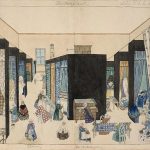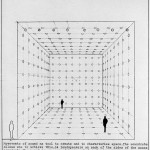Together with John Steuart Curry and Thomas Hart Benton, Grant Wood was one of the three major figures of American regionalist art movement of the early years of 20th Century. Following a period of trips to Europe and an interest for impressionist and post-impressionist styles, he discovered the work of 15th Century Flemish artist Jan van Eyck, which representated a strong influence all over his future production.
Regionalism was a social realist art movement that proposed a reassuring view of American rural life (agricultural work was a frequent subject) and had a peak between 1930 to 1935.
The debate over Modernism was really a debate over which of the two predominant art styles (Regionalism against Abstract Expressionism) should represent American art (a debate which took origin from the Armory Show of 1913, where the first contrasts between Abstraction coming from Europe and Realism were expressed), and it became a conflict between two opposed political visions. Geographically based in rural areas, the Regionalist addressed social, economic and political issues with a conservative stance, whereas the New York area-based Abstract expressionism movement was promoted by pro modernist intellectuals as Alfred Stieglitz.
Although Regionalism fate was sealed by the ultimate triumph of Abstraction, the former movement was later considered as a catalytic vector of emancipation of American art respect of Europe and as an important bridge between Abstract art and Academic Realism “in much the same way that Impressionism and the Post-Impressionists like Paul Cézanne, Vincent van Gogh, and Paul Gauguin among others had done in France a generation earlier” (from Wikipedia)
Also from Wikipedia: “In Grant Wood’s pamphlet ‘Revolt Against the City’, published in Iowa City, 1935, (Grant Wood) asserts that American artists and buyers of art were no longer looking to Parisian culture for subject matter and style. Wood wrote that Regional artists interpret physiography, industry, and psychology of their hometown, and that the competition of these preceding elements creates American culture. He wrote that the lure of the city was gone, and hopes that art of the widely diffused “whole people” would prevail. He cites Thomas Jefferson’s characterization of cities as “ulcers on the body politic.” “
Images via: El Vuit Bruit













Leave a Reply